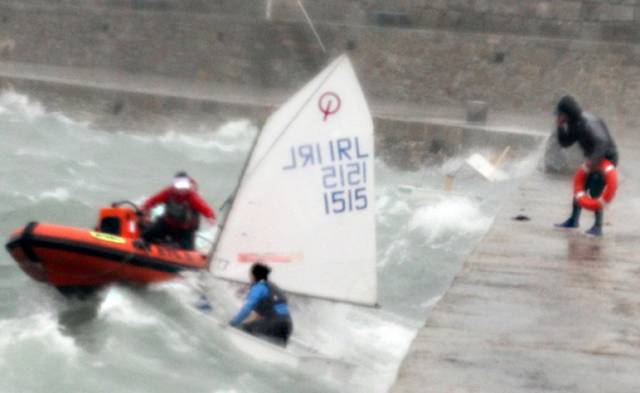#Optimist - An independent report into an incident involving Irish Sailing’s junior Optimist squad last year, during which almost half the dinghy fleet sustained significant damage, has criticised the organisation’s coaching systems.
Scroll down the page to download the full report.
The review of the October 2017 incident in Dun Laoghaire Harbour, in which seven sailors were forced to abandon their dinghies in high winds while the lead coach’s RIB lost engine power, found that appropriate preparations had not been put in place for the coaching session.
However, the report defended the coach’s decision to launch the junior fleet as a storm approached, finding that he acted “in good faith” and that he believed a two-hour sailing session was possible.
The report’s criticisms focus on the structure behind the sailing programme, finding that “appropriate equipment, resources and facilities were not provided”. Both the lead and assistant coaches had not met until the morning of the training session, were unfamiliar with their RIBs and launched without VHF radio communications.
Early into the coaching session, winds changed direction and gusts increased in strength. Some of the sailors began to experience difficulties as conditions worsened, so it was decided to abandon the coaching session.
Nine of the squad members returned to shore under their own sail power. However, the remainder of the fleet, in a more open leeward position, got caught in unusually high and confused wave patterns near the East Pier. These seven junior sailors were forced to abandon their dinghies, which eventually sustained significant damaged from impact against the pier wall.
By the time the incident escalated to emergency proportions, the lead coach’s RIB was disabled by a fuel-related engine failure and was drifting towards the East Pier wall. The report applauded the actions of the assistant coach who assumed charge and rescued four sailors from the water.
The review found that the Optimist Squad programme was established without “any obvious or adequately structured project management approach” and that there was “a lack of clarity” as to who was responsible for preparing the coaching session.
This in turn led to “hasty and incomplete preparations”, which failed to provide the coaches with a proper induction and failed to provide “the essential resources, facilities and equipment needed” for the coaching session.
The review recommended a “top-down internal review” of the management of performance coaching programmes. It noted that there was “a complete lack of clarity as to who was directly responsible for making and ensuring that adequate practical preparation was made” for the coaching session, adding that “in such circumstances, balance of judgement must swing toward failures of processes and systems which ought to have been in place, rather than on the actions, or omissions, of any of those individuals directly involved.”
Speaking ahead of the publication of the report, at last Friday's Irish Sailing Awards where he gave the opening address, Irish Sailing President Jack Roy said: “As an adventure sport, sailing has its inherent risks. We know this every time we go afloat. We also know we have a duty to protect ourselves and others."
Roy was referring to two heroic rescues that were saluted on the night but he also used the opportunity to tell the gathering that one of the outcomes from the Optimist Incident report includes "a rigorous overhaul of the association’s own safety guidelines that will be extended to all clubs and classes".
On publication of the report today, Roy told Afloat.ie: "Irish Sailing fully supports the outcomes of the report and have appointed a working group to consider the recommendations, assess how best Irish Sailing can address them, and help with the implementation.
"This group has already begun work on the recommendations and are aiming for initial outcomes to be completed by 31st March 2018."
The full report and the executive summary is downloadable below.
































































